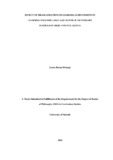| dc.description.abstract | xvii
ABSTRACT
This study sought to establish that dramatization is an effective strategy in teaching the English language and promotes learner achievement in Igembe North and Imenti South District, in Kenya. The study was carried out in public secondary schools in Meru county, Kenya. It set out to establish the effect of role play, simulation, Mime and language games in curriculum implementation at secondary school level. The study was guided by five objectives and five hypotheses related to the objectives. The objectives were: to establish the extent to which role-play influences learner achievement in learning of the English language in Meru North and Imenti-South Secondary schools; to determine how simulation can be integrated in the process of learning the English language in secondary schools in Imenti North and Imenti South, districts; examine the utility of dramatization in the communicative approach of learning the English language in secondary schools in Meru- North and Imenti South districts; to examine the attitude of learners and teachers towards language game as an activity of enhancing learning of the English Language in Secondary schools in Meru-North and Imenti South Districts; to establish learners‟ achievement of the English Language when dramatization is used in teaching and learning of the English Language in Secondary Schools, in Meru North and Imenti South, Districts. Quasi- experimental design was adopted for the study. The target population included head teachers, teachers, education offices and learners in public secondary schools in Meru county, which had form three and four classes as at January, 2012. A sample of 66 head teachers, 126 teachers, 15 education officers and 314 learners were selected from 66 public secondary school out of a total of 82 schools, to represent teachers, education officers and learners. This served as a basis for analysis of main characteristics and their contribution to dramatization in teaching and learning of the English language. The multiphase sampling procedure was adapted for this study. Data was collected using questionnaires, test scores and guided interview. The resultant information was analyzed using SPSS, quantitative and qualitative approaches. This study established that teaching strategies such as role play, simulation, language games and mime have a significant influence on learner achievement. It was established that dramatization is relevant to teaching of the English Language, its utility was superior than lecture strategy as shown in table 4.39. This study recommends that the government, should plan to address the issue of including dramatization in teaching the integrated syllabus by requesting KICD to incorporate dramatic genres, in language curriculum; this research suggests further study, on interference of “sheng” in the learning of the English Language, in Meru county. | en_US |



